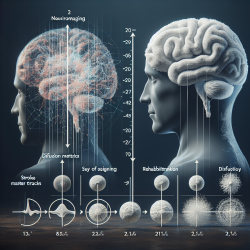Understanding MCT8 and Its Impact on Child Development
As practitioners dedicated to enhancing child development, understanding the genetic underpinnings that influence intellectual and motor disabilities is crucial. The recent study titled Clinical and Functional Consequences of C-Terminal Variants in MCT8: A Case Series provides valuable insights into the role of MCT8 in child development. This research is particularly relevant for speech-language pathologists who are keen on making data-driven decisions to improve therapy outcomes.
The Role of MCT8 in Child Development
MCT8, or monocarboxylate transporter 8, is a critical thyroid hormone transporter. Variants in the SLC16A2 gene, which encodes MCT8, can lead to MCT8 deficiency, characterized by severe intellectual and motor disabilities. Understanding these genetic variants is vital for practitioners as it allows for a more accurate assessment of developmental delays and the tailoring of intervention strategies.
Key Findings from the Research
- The study identified five novel variants within the C-terminal domain of MCT8.
- Some variants, such as the missense variants p.His575Arg and p.Asn599Ser, did not affect MCT8 function in vitro, suggesting they may be benign.
- Frameshift variants that elongate the MCT8 protein showed reduced activity, correlating with less severe clinical phenotypes.
- Truncating variants within the transmembrane domain were fully inactivating, while those within the intracellular C-terminal tail were generally well-tolerated.
Implications for Speech-Language Pathology
For speech-language pathologists, these findings underscore the importance of genetic screening in children with unexplained developmental delays. By understanding the specific genetic variants present, practitioners can better predict developmental trajectories and tailor interventions accordingly.
Moreover, the research highlights the need for a multidisciplinary approach in managing MCT8 deficiency. Collaborating with geneticists and neurologists can provide a more comprehensive understanding of each child's unique needs, leading to more effective therapy outcomes.
Encouraging Further Research
This study opens the door for further research into the functional relevance of the C-terminal domain of MCT8. Practitioners are encouraged to stay informed about ongoing research and consider participating in studies that explore the genetic basis of developmental disorders. Such involvement not only advances the field but also enhances the quality of care provided to children.
Conclusion
Understanding the genetic basis of developmental disorders is essential for speech-language pathologists committed to improving child outcomes. The insights from the MCT8 study provide a valuable framework for making data-driven decisions in therapy. By integrating genetic information into practice, practitioners can offer more personalized and effective interventions.
To read the original research paper, please follow this link: Clinical and Functional Consequences of C-Terminal Variants in MCT8: A Case Series.










